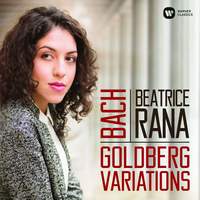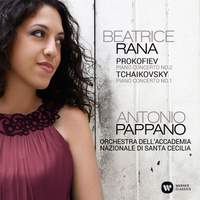Interview,
Beatrice Rana on the Goldberg Variations
 The young Italian pianist Beatrice Rana is currently in the middle of something of a Goldberg odyssey - with performances at venues including the Wigmore Hall and Rome's Accademia Nazionale di Santa Cecilia already under her belt, the coming month will see her performing Bach's mighty set of variations across the United States, in Tokyo, Aix-en-Provence, and eventually just up the road from us in Birmingham. Her recording of the work (released on Warner Classics last month) is an Editor's Choice in this month's Gramophone and was described as 'a supremely intelligent reading' by The Sunday Times.
The young Italian pianist Beatrice Rana is currently in the middle of something of a Goldberg odyssey - with performances at venues including the Wigmore Hall and Rome's Accademia Nazionale di Santa Cecilia already under her belt, the coming month will see her performing Bach's mighty set of variations across the United States, in Tokyo, Aix-en-Provence, and eventually just up the road from us in Birmingham. Her recording of the work (released on Warner Classics last month) is an Editor's Choice in this month's Gramophone and was described as 'a supremely intelligent reading' by The Sunday Times.
Our friends at Warner Classics kindly arranged for Beatrice to answer some questions from us on video while she was in London earlier this month - watch or read on to find out more about her life-long love-affair with Bach, her approach to performance-practice and the pleasures and challenges of recording the cycle…
Full transcript of this 8-minute video:
You've previously described Bach as your 'first love': when and how were you first exposed to his music?
Since the very beginning I was exposed to Bach’s music, because I was born into a musicians’ family: both my parents are pianists, and every time there is a child approaching the piano and the study of the piano, Bach is one of the first composers that they approach. And then all of a sudden I was just dreaming of playing everything by Bach… but at some point when you get older, you have to enrich the repertoire because the piano literature is extremely wide, but somehow Bach has always had a special place in my heart.
Are you someone who prefers to avoid listening to existing recordings when you're preparing a work as monumental (and much-recorded!) as this, or have any interpretations on record been a particular influence on you?
I usually avoid listening to any recordings of all the pieces that I am learning and practising, because I think that I have to be authentic and very sincere to the score, and somehow all the influences coming from different recordings could disturb me from the process of really looking into the music. But at the same time, playing a piece like the Goldbergs cannot mean not listening to any of the recordings, because it’s such a well-known piece; I actually remember listening to the Glenn Gould recording for the first time, and it was a very shocking experience! And even though I am not listening to it very much these days, I still remember the emotional impact which it had on me.
Where do you stand on the debates about historically-informed performance when it comes to the Goldbergs (and how does it affect your decisions about things like ornamentation and pedalling)?
There is always this trouble about how to play Bach, and that’s why I always avoided playing it in competitions: it’s very controversial, and somehow everyone thinks they are right, which could be true! From my point of view, I am a pianist, and so I take advantage of all the technology that the piano has. That doesn’t mean that I have to play as loudly as possible, or that I need to have a Lisztian approach, for example - but I am playing the Goldbergs in such huge halls (which Bach would never have imagined!), and to fill such halls with sound an instrument like the piano is what’s needed. So for example I use the pedal, and I also use dynamics which aren’t really possible on the harpsichord - but at the same time I try to be respectful to the baroque style, and just to translate it to the modern language of the piano.
You also perform a lot of Romantic repertoire: does this feed into how you interpret Bach, or do you feel that would be anachronistic?
I think of all of the repertoire that I play is somehow useful for Bach, and Bach is useful for the other repertoire – usually the more you know the better it is! And there are many composers afterwards who took inspiration from Bach. Of course it’s difficult to keep the proper sound and the proper style when you have so much repertoire in the same days, but I always feel very much at ease when I play Bach and somehow it’s very easy to find that mode all of a sudden. I cannot say the same for other composers, but with Bach I always have this kind of very direct approach.
Tell me a little about making the recording itself: with a such a cyclic, meditative work as this, how difficult is it to stop and start for new takes? And how does it feel to play it without a 'live' audience: challenging or liberating?!
Recording the Goldbergs has been one of the most amazing and the most difficult experiences in my life, for two main reasons: first of all, the architecture. Even though it’s an incredibly huge piece, there is a very precise structure and there is also a very strong emotional process during the performance, and it’s so difficult to sustain that during the recording when there are so many takes and actually the performance is split over three days! And the second reason is the emotional impact: every time that I play the Goldbergs in front of the public I always feel that it’s a very special and unique experience, because you rarely get to play such a long piece in front of an audience that doesn’t interact with you besides with their silence! Somehow I always feel that at the end of the Goldbergs in a live performance there is a change in myself and a change in the audience, so I just had to imagine this change when I was recording, and that was the most challenging aspect for me.
You've just embarked on an extensive tour with the Goldbergs - is performing them on so many different instruments and in such different sizes of venue altering your approach?
Every performance is enriching my view of the Goldbergs. Generally speaking, that is true of all the repertoire that I play, but it’s especially true of the Goldbergs: we are talking about a work which really needs a lifetime to understand them and to experience them and develop, so I’m totally aware of this and I’m sure that right now I have a very youthful way of approaching them, which is not a negative aspect of my playing. I just think that right now I see the Goldbergs in a very human way, but I don’t blame those that think differently from me, and probably playing them so many times on stage will make me understand different points of view. But that doesn’t mean that it’s less ‘true’ than something in the future or in the past: it’s just a very personal and sincere approach to every single performance on stage.
Beatrice Rana's recording of the Goldberg Variations was released on 24th February on Warner Classics.
Available Formats: CD, MP3, FLAC, Hi-Res FLAC, Hi-Res+ FLAC
Other recordings by Beatrice Rana
'Rana is fierce! And not only as a pianist but as a fully developed artist of a stature that belies her tender years.' (Gramophone)
Available Formats: CD, MP3, FLAC, Hi-Res FLAC
'Rana is clearly a pianist whose attentions are directed towards the lyric...her technique is steady, and completely subservient to her wish to underline Chopin’s aching melancholy.' (International Piano)
Available Formats: MP3, FLAC, Hi-Res FLAC
'A musician of the most refined sensibilities as well as staggering accomplishment.' (International Record Review)
Available Formats: MP3, FLAC, Hi-Res FLAC






